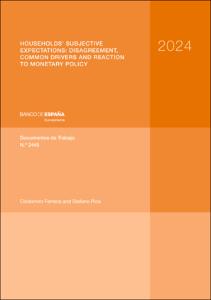Households’ subjective expectations: disagreement, common drivers and reaction to monetary policy
Autor
Fecha de publicación
26-nov-2024
Descripción física
83 p.
Resumen
Utilizando datos granulares sobre las expectativas subjetivas de los hogares de varios países de la eurozona, encontramos una robusta reacción positiva de las expectativas de inflación ante un shock contractivo de la política monetaria, un resultado que contradice las teorías estándar del equilibrio general con rigideces nominales. A continuación investigamos lo que subyace a tal resultado. Aunque los hogares presentan marcadas divergencias en el nivel de sus expectativas, estas están correlacionadas a lo largo de la muestra. Dos componentes principales explican una parte importante de la varianza de todas las expectativas. Estos componentes capturan las percepciones de los hogares sobre las fuentes de la dinámica macroeconómica: el primero captura una visión del lado de la oferta o un disgusto general por la inflación, mientras que el segundo refleja una percepción de las presiones de la demanda. Esta estructura de divergencias es estable entre países y a lo largo del tiempo y no parece variar en función de las características demográficas o socioeconómicas. Finalmente, utilizamos estos resultados para identificar dos factores comunes que impulsan las expectativas a lo largo del tiempo. Tales factores son consistentes con un discurso basado en las presiones inflacionarias percibidas desde el lado de la oferta después de la invasión de Ucrania en febrero de 2022, así como con la dinámica general de inflación a la baja intensificada por la reacción del Banco Central Europeo.
Using granular data on household subjective expectations for several countries, we uncover a robust positive reaction of inflation expectations to a contractionary monetary policy shock, a result at odds with standard equilibrium theories with nominal rigidities. We then investigate what lies behind such result. Although households disagree, their expectations are correlated in the cross-section. Two principal components account for a significant portion of the variance of all expectations. These components capture households’ perceptions of the sources of macroeconomic dynamics, with the first capturing either a supply-side view or an overall dislike for inflation, and the second component reflecting a perception about demand pressures. This structure of disagreement is stable across countries and over time and does not vary with demographic or socioeconomic characteristics. We then use these insights to identify two common factors driving expectations over time. These factors are consistent with a narrative based on perceived supply-side inflationary pressures after the invasion of Ukraine in February 2022, as well as with the overall downward inflation dynamics intensified by the reaction of the ECB.
Using granular data on household subjective expectations for several countries, we uncover a robust positive reaction of inflation expectations to a contractionary monetary policy shock, a result at odds with standard equilibrium theories with nominal rigidities. We then investigate what lies behind such result. Although households disagree, their expectations are correlated in the cross-section. Two principal components account for a significant portion of the variance of all expectations. These components capture households’ perceptions of the sources of macroeconomic dynamics, with the first capturing either a supply-side view or an overall dislike for inflation, and the second component reflecting a perception about demand pressures. This structure of disagreement is stable across countries and over time and does not vary with demographic or socioeconomic characteristics. We then use these insights to identify two common factors driving expectations over time. These factors are consistent with a narrative based on perceived supply-side inflationary pressures after the invasion of Ukraine in February 2022, as well as with the overall downward inflation dynamics intensified by the reaction of the ECB.
Publicado en
Documentos de Trabajo / Banco de España, 2445
Materias
Encuesta; Expectativas; Divergencias; Política monetaria; Survey; Expectations; Disagreement; Monetary policy
Aparece en las colecciones:












